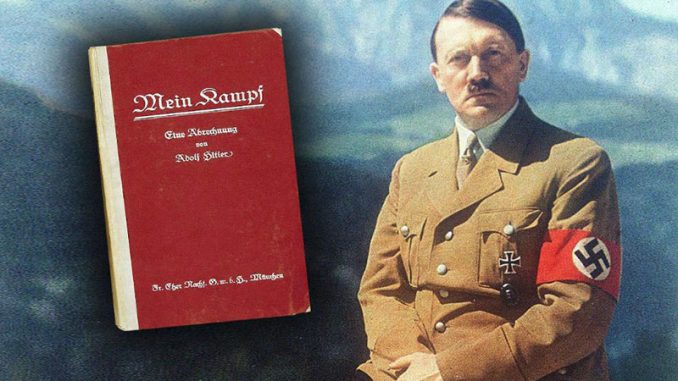
Adolf Hitler’s manifesto, Mein Kampf, is a besteller in Germany again.
The book was reprinted with a number of annotations and has been available in German book-stores since January

BYPASS THE CENSORS
Sign up to get unfiltered news delivered straight to your inbox.
You can unsubscribe any time. By subscribing you agree to our Terms of Use
Latest Video
While news stories of a plague of new xenophobic attacks in Germany have recently made headlines across the world, the publication of Hitler’s book (the first republication in Germany since WWII) – and it’s sudden rise to newfound fame (24,000 copies sold in under 2 months) – may not be such a bad thing when examined closer,
The Washington Post explains:
Yet there’s no reason to think Hitler’s manifesto is to blame for the hostility toward refugees. For starters, the new “Mein Kampf” is hardly a neo-Nazi’s dream. At 1,966 pages and 12 pounds, the two-volume edition is riddled with 3,700 footnotes and annotations, all snaking around Hitler’s words like a textual cordon. The oversized volumes have been compared to the Talmud — the classic Jewish text of rabbinic commentary on the Torah and on earlier interpretations of it — by Dan Michman, head of international research at Yad Vashem, Israel’s museum of the Holocaust. Reading this book is like a forced march to the library, says Berlin-based historian Michael S. Cullen: “It’s unwieldy. You have to have both books open on your desk at the same time to cross-check references and use it properly.”
As a further deterrent to those seeking fodder for xenophobic, anti-Muslim or anti-Semitic beliefs, this tome costs $65. For the hardcore hater, it’s far easier to download Hitler’s raw text for free from the Internet. Even older printed versions of “Mein Kampf” have long been legally available to Germans in research libraries and some antiquarian book stores; only republication was blocked for seven decades. (The book was always available outside Germany, but its domestic rights were owned by the state of Bavaria until the copyright expired.)
This new edition is aimed at academics, teachers and journalists — “knowledge multipliers,” in the words of historian Andreas Wirsching, director of Munich’s respected Institute for Contemporary History, which published the book. But with orders mounting, the new “Mein Kampf” has obviously become an object of intense curiosity by the broader public. Buyers of the book probably skew toward the educated and liberal-minded, says German-Jewish writer Rafael Seligmann, even if many are “just putting it on their bookshelves to prove that they are engaged with the past.” Given that the new edition is billed by its publishers as a rebuttal and counter-narrative to Hitler’s text, using it as intellectual window-dressing hardly seems the worst thing a conscientious German could do.
The book’s sudden popularity should be seen as a good sign. It means that Germans, even three generations after the war, are still seeking an understanding of what went wrong. Today’s young Germans, raised in a model democracy, are as baffled as the rest of the world as to how things could have gone so horribly awry. And while all German schoolchildren are taught Nazi history and taken to historical sites, “Mein Kampf” has until now been treated as taboo material.
The republication of Hitler’s book in Germany was attended by considerable hoopla — TV specials, a huge press conference, a sort of town meeting in Munich. This is the stuff of bestsellerdom. Yet the book’s high sales also echo the outpouring of interest in the newly-opened Munich National Socialism Documentation Center, an exhibition hall and teaching facility on the site of Hitler’s old Nazi Party headquarters called the Brown House. In its first 10 months, Director Winfried Nerdinger said last week, the center drew 200,000 visitors, including large numbers of young people.
I received my copy of the new “Mein Kampf” (the scholarly edition is still available only in German) a few weeks ago. I must say, it is both fascinating — and an uphill slog. Hitler is already a challenging read, even without the commentary; I had been through it twice, in German and in English, while researching my new book on Hitler. The language is easy enough, in either language, but Hitler’s staccato thinking and sweeping statements sometime make reading “Mein Kampf” feel like swimming through molasses. The new footnotes, while riveting, take time to read; they totally break up the flow of the book. To that extent, the authors have already succeeded in boxing in Hitler and dulling the grandeur of his claims.
The “critical edition,” as this one is called, does something else important, as well: It provides the bibliography and footnotes that Hitler left out. The future Führer, banging away in 1924 on a portable Remington typewriter in his cell at Landsberg Prison, wrote in the oracular voice. He didn’t bother to provide context, attributions or footnotes. His glancing references are often obscure or historically shrouded. Paragraph by paragraph, the annotated edition fills in the blanks of Hitler’s often shoddy research, exposing his careless intellectual leaps and flat-out lies. The footnotes also give us a glimpse of what his magpie mind had picked up during his eclectic and racist reading days in Vienna, from 1908 to 1913. In effect, we are presented with the intellectual midden of Hitler’s unstructured life, the uncited and still nebulous research foundation of his book with its race-centered theories that, finally, justified genocide.
The Munich scholars have pulled off a remarkable feat. They have rendered “Mein Kampf” something other than what it formerly was. Hitler’s book is no longer Hitler’s book; it is the researchers’ book. There are far more words by the scholars than by the author. “Hitler, Mein Kampf: Eine Kritische Edition” is a book about a book, and an era, that still need exploring. The more readers it gets, the better.


